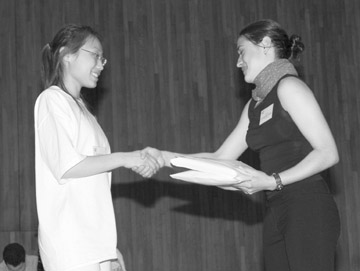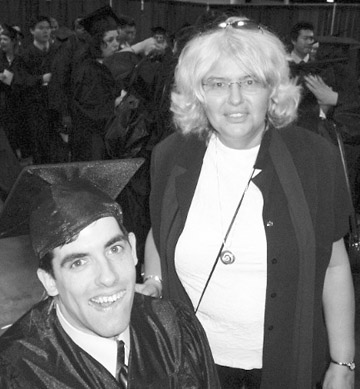Student, Faculty Diversity Up, Tensions Remain
March 13, 2004
A report released by the head of the university’s faculty council says racial diversity among students and faculty has been on the rise for the last several years, amid tense race relations in the community.
Celia Moore, professor of psychology and chair of the faculty council, released the report at the council’s March meeting, triggering debate at a university already wracked by racial friction. Tensions have been on the rise in the last year after the arrest of an Africana Studies professor, the resignation of a college dean, and a closed-door meeting of a university task force on diversity. Diversity on campus is “greater than it’s ever been,” Moore told the council.
The report, compiled using data from the university’s Office of Institutional Research, shows a steady rise in the enrollment of minority students since 1980, when it was at 14%, to Fall 2003, when levels reached nearly 40%. The numbers make UMass Boston the most diverse public university in the New England region, with Southern Connecticut State University trailing behind at 23%, and UMass Lowell around 20%.
Although diversity among faculty is not as great as in the student body, it has also been on the rise, according to the data. While 14% of faculty members of color were among the retirees in the last three years, 32% of new hires are men and women of color. “As a result of the changing demographics caused by retirements and hires during the most recent five year period, the percentage of faculty of color in tenured or tenure track lines increased from 19% to 20% and the percentage of white faculty decreased from 80% to 79%,” read the report.
Diversity increased in the Graduate College of Education, the College of Management, and the College of Liberal Arts and the College of Science and Mathematics, but decreased in the College of Public and Community Service and the College of Nursing and Health Sciences. “There has been a 9% reduction in the proportion of UMass Boston tenure-line faculty of color who are affiliated with CPCS,” says the report. “This shift reflects both a decrease in the tenured faculty of this college (27% reduction of tenure lines from 1999) and increased numbers of faculty of color through recruitment of replacements in other colleges.”
Putting “Facts On The Table”
Moore, who is also chairing a NEASC self-study on the university’s mission and purpose, had attended a recent meeting of a task force formed by the UMass Board of Trustees to look into the racial climate at the Boston campus. Few were allowed in, and four campus police officers were on hand to bar the door, at the request of Karl E. White, the UMass trustee heading up the task force. While listening to colleagues talk at the meeting, Moore said she realized how little was known about diversity at UMass Boston, and decided to put “the facts on the table.”
“Facts are always a good place to start,” she said.
“Now, what I think is perhaps the source of some of the problems, possibly some of the misperceptions, is that if you look just within CPCS, you get a decline in faculty diversity over the past few years. And that’s because there’s been a decline in faculty and, for whatever reason, it’s been a little bit disproportionate,” said Moore.
But the reality is that the lines are being rebuilt across the university, she said, adding that part of the issue is that what is getting mixed up in the discussion is the reallocation of those lines.
“A lot of the reports in the media are listed as anonymous. It is certainly the case that a lot of concerns I’ve heard voiced coming from that college are not anonymous,” she said. “It’s a college that’s had some challenges in the past few years,” among them declining enrollment, something CPCS officials attribute to the admissions process.
“As a whole, we’ve been experiencing an improvement,” she said. “We think that if recruitment patterns continue as they have thus far, we’ll be doing even better in academic year 2005.”
CPCS Community Planning Professor Luis Pares-Aponte said he was “frustrated” with the state of race relations. Changes are taking place, he said, and people of color aren’t being heard and their contribution isn’t recognized.
“It’s not just about numbers. It’s how the people who represent those numbers feel. I think that’s what the Board of Trustees is trying to get at, and not in the best possible way,” said Sarah Bartlett, administrative dean for CPCS.
The arrest of Africana Studies Professor Tony Van Der Meer after an altercation with a National Guardsman and the resignation of popular CPCS Dean Ismael Ramirez-Soto both set off firestorms in the university community over the state of race relations. In response, a Public Safety Advisory Board has been formed and the Department of Public Safety has been placed under the purview of Vice Chancellor of Student Affairs J. Keith Motley.
Charges of “Marginalization”
The outcry does not appear to be exclusive to CPCS. Professors Tim Sieber of Anthropology and Robert Johnson of Africana Studies are also outspoken on the issue of racial diversity on campus.
“It’s very useful to have Celia Moore’s good report on diversity data for students and faculty,” said Sieber, stating in an e-mail that it was especially important to note that “UMB is a wonderful and welcoming institution for all kinds of students, including students of color.”
But many people believe there is a problem with the racial climate, according to Seiber, and many people “don’t know or understand there is a problem, and are surprised to hear people say there is.” Dialogue is needed, he said in an earlier interview. “And people who don’t understand why should be more concerned and try to find out why.”
Professor Johnson, while saying he wasn’t surprised that the university was becoming increasingly diverse student-wise, called the racial climate “terrible,” and the “worst racial climate I’ve ever been a part of.”
“‘Marginalization’ is the word people use,” he said, adding that he could speak for the department when he said Africana Studies was “totally marginalized.”
Johnson pointed to the department’s lack of a tenure line in African-American history as an example. The line automatically reverted to the provost two years ago when the person holding it left, he said. The department has repeatedly requested return of the line, but it hasn’t happened, he said, adding that the English department recently received two lines to teach African American literature. “We conclude that the administration is retaliating against us.”
Winston Langley, associate provost, said the English department had initially requested one line, but in the process of hiring, came across two outstanding minority candidates, so they made a request for both, which the provost approved.
“That’s hardly seeking to create a hostile racial climate,” he said. Decisions are made on priorities established by deans, he added, which in turn are established by budget cuts, the nature of the needs of the department and enrollment. “It doesn’t mean they will not get a tenure line,” he said. “Many departments request lines over a period of time before they actually get the lines.”
Nor has there been any retaliation by the administration, he said. “There has been no retaliation against anybody. While it’s understandable that Professor Johnson is disappointed at not having his request met, the provost is committed to supporting the Africana Studies Department.”























































